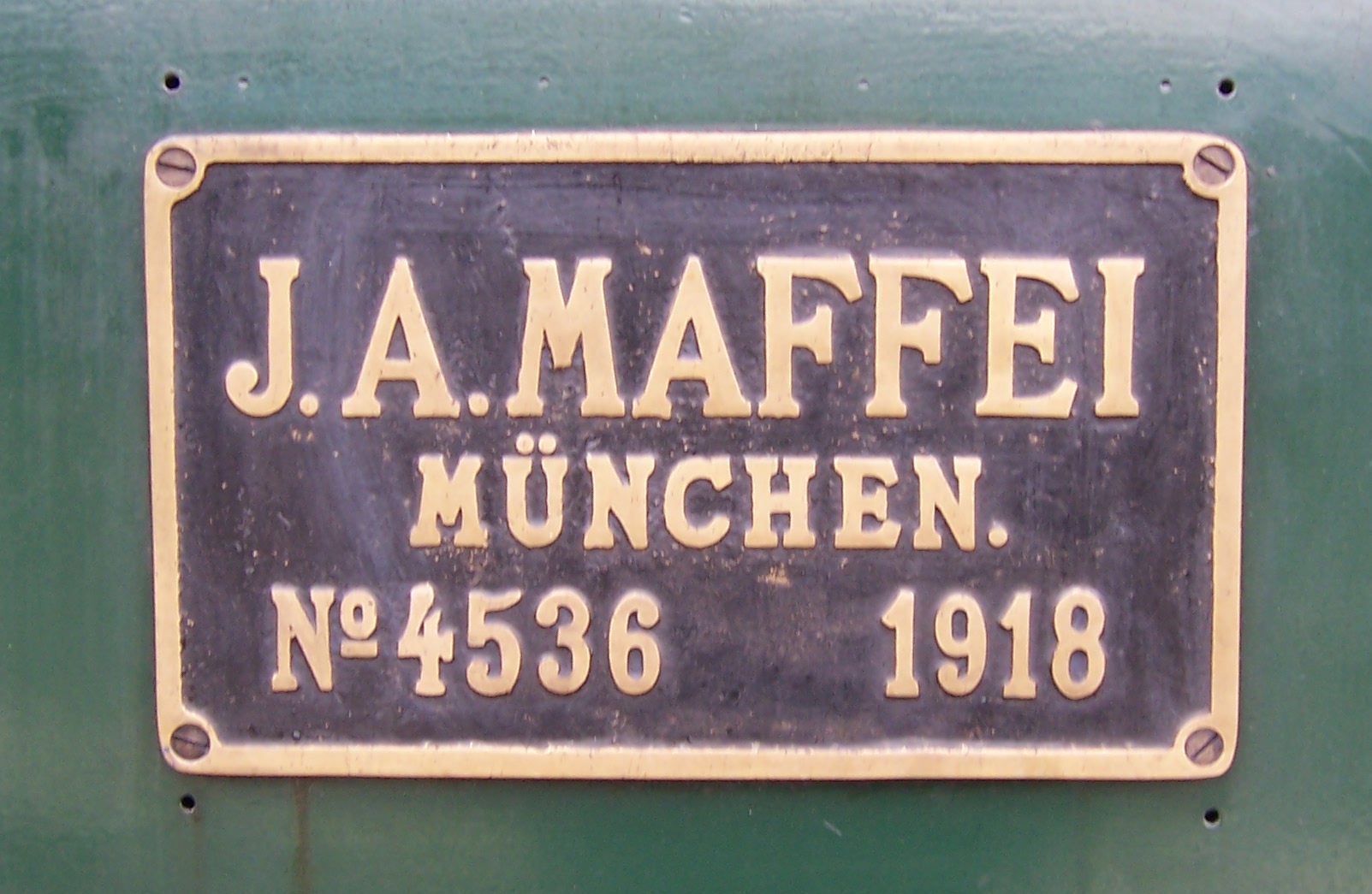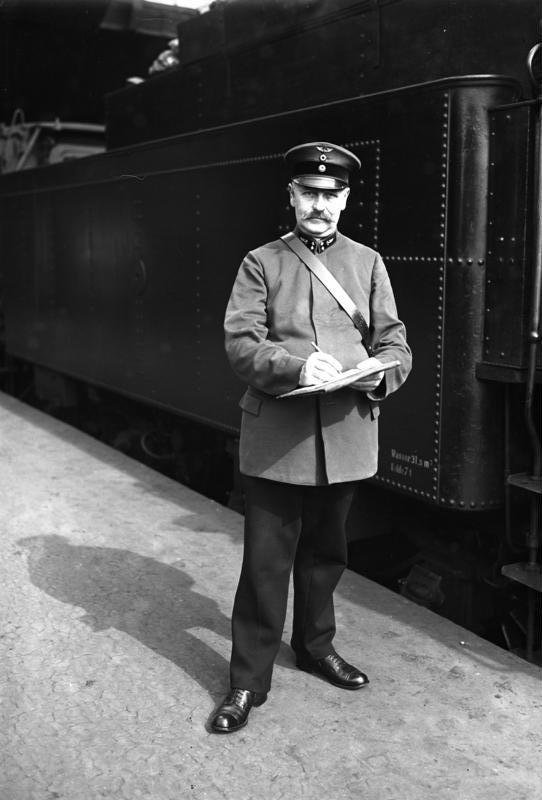|
Bavarian C IV
The C IV was a steam locomotive, built for goods train duties, that was manufactured between 1884 and 1897 for the Royal Bavarian State Railways (''Königlich Bayerische Staatsbahn''). Description Between 1884 and 1893 a total of 87 units two-cylinder, saturated steam engines were delivered. They were followed by two Compound locomotive, compound engines in 1889 for testing and then 98 more compounds from 1892 to 1897. The locomotives, which for the first time did not have the external Locomotive frame, frames typical in Kingdom of Bavaria, Bavaria up to that time, were soon no longer equal to the growing demands made on them. In spite of that, many were taken over by the Deutsche Reichsbahn-Gesellschaft, Deutsche Reichsbahn, designated as Class 53.80-81 and allocated the operating numbers 53 8011 to 8064 and 53 8081 to 8168. The two-cylinder engines were equipped with a Bavarian Class 3 T 10.2 tender (rail), tender; they were all retired by 1926. The compound variants ... [...More Info...] [...Related Items...] OR: [Wikipedia] [Google] [Baidu] |
Maffei (company)
Maffei was a manufacturer of railway locomotives based in Munich, Germany. Established in 1836, it prospered for nearly a century before going bankrupt in 1930 and becoming amalgamated with the firm of Krauss to form Krauss-Maffei. Following another seventy years of prosperity Krauss-Maffei merged with Demag and Mannesmann in 1999, the resulting conglomerate in turn being sold to Siemens AG. Perhaps J. A. Maffei's most famous product was the S3/6 4-6-2 locomotive of 1908. In 1836, Joseph Anton, Ritter von Maffei established the "J. A. Maffei" locomotive works in the English Garden district of Munich. The aim was to make Bavaria competitive in the machine industry. From these small beginnings a world-renowned locomotive works eventually developed. In 1864 they delivered their 500th locomotive. Maffei, as a Munich town councillor, was praised for the building of the Hotel Bayerischer Hof. Well-known products of the locomotive works are the Bavarian S 2/6 express locomotive ... [...More Info...] [...Related Items...] OR: [Wikipedia] [Google] [Baidu] |
Tender (rail)
A tender or coal-car (US only) is a special rail vehicle hauled by a steam locomotive containing its fuel (wood, coal, oil or torrefied biomass) and water. Steam locomotives consume large quantities of water compared to the quantity of fuel, so their tenders are necessary to keep them running over long distances. A locomotive that pulls a tender is called a tender locomotive. Locomotives that do not have tenders and carry all their fuel and water on board the locomotive itself are called tank locomotives. A corridor tender is a locomotive tender with a passageway to one side, allowing crew changes on the fly. A brake tender is a tender that is heavy and used (primarily) to provide greater braking efficiency. General functions The largest steam locomotives are semi-permanently coupled by a drawbar to a tender that carries the water and fuel. The fuel source used depends on what is economically available locally. In the UK and parts of Europe, a plentiful supply of coal made ... [...More Info...] [...Related Items...] OR: [Wikipedia] [Google] [Baidu] |
C N2 Locomotives
C, or c, is the third letter in the Latin alphabet, used in the modern English alphabet, the alphabets of other western European languages and others worldwide. Its name in English is ''cee'' (pronounced ), plural ''cees''. History "C" comes from the same letter as "G". The Semites named it gimel. The sign is possibly adapted from an Egyptian hieroglyph for a staff sling, which may have been the meaning of the name ''gimel''. Another possibility is that it depicted a camel, the Semitic name for which was ''gamal''. Barry B. Powell, a specialist in the history of writing, states "It is hard to imagine how gimel = "camel" can be derived from the picture of a camel (it may show his hump, or his head and neck!)". In the Etruscan language, plosive consonants had no contrastive voicing, so the Greek ' Γ' (Gamma) was adopted into the Etruscan alphabet to represent . Already in the Western Greek alphabet, Gamma first took a '' form in Early Etruscan, then '' in Classical Etru ... [...More Info...] [...Related Items...] OR: [Wikipedia] [Google] [Baidu] |
Railway Locomotives Introduced In 1884
Rail transport (also known as train transport) is a means of transport that transfers passengers and goods on wheeled vehicles running on rails, which are incorporated in tracks. In contrast to road transport, where the vehicles run on a prepared flat surface, rail vehicles (rolling stock) are directionally guided by the tracks on which they run. Tracks usually consist of steel rails, installed on sleepers (ties) set in ballast, on which the rolling stock, usually fitted with metal wheels, moves. Other variations are also possible, such as "slab track", in which the rails are fastened to a concrete foundation resting on a prepared subsurface. Rolling stock in a rail transport system generally encounters lower frictional resistance than rubber-tyred road vehicles, so passenger and freight cars (carriages and wagons) can be coupled into longer trains. The operation is carried out by a railway company, providing transport between train stations or freight customer facili ... [...More Info...] [...Related Items...] OR: [Wikipedia] [Google] [Baidu] |
Krauss Locomotives
Krauss is a German surname. Notable people with the surname include: * Alison Krauss (born 1971), American bluegrass musician * Alexander Krauß (born 1975), German politician * Alexis Krauss (born 1985), musician of the noise pop duo Sleigh Bells * Anna Krauss (born 1884) German clairvoyant * Beatrice Krauss (1903–1998), American botanist * Clemens Krauss (1893–1954), Austrian conductor * Charles A. W. Krauss (1851–1939), American politician * Christian Ferdinand Friedrich Krauss (1812–1890), known as Ferdinand Krauss, German scientist, traveller and collector * Friedrich Salomon Krauss (1859–1938), Austrian ethnographer * Gabrielle Krauss (1842–1906), Austrian-born French operatic soprano * Georg Krauß, (1826–1906), German industrialist and the founder of the Krauss Locomotive Works ** Krauss-Maffei, German engineering company, named in part after Georg Krauß * Hermann August Krauss (1848–1937), Austrian entomologist * Johan Carl Krauss (1759–1826), German ph ... [...More Info...] [...Related Items...] OR: [Wikipedia] [Google] [Baidu] |
Maffei Locomotives
Maffei is a surname of Italian origin. Surname *Alberto Maffei (born 1995), Italian snowboarder *Alessandro, Marquis de Maffei (1662–1730), Bavarian general * Agnese Maffeis (born 1965), Italian discus thrower and shot putter *Andrea Maffei (1798–1885), Italian poet and librettist *Andrea Maffei (architect) (born 1968), Italian architect * Angela Maffeis (born 1996), Italian cyclist * Antonio Maffei (died 1482), Italian bishop * Antonio Maffei da Volterra (1450–1478), Italian clergyman and member of the Pazzi Conspiracy * Arturo Maffei (1909–2006), Italian long jumper and footballer *Ascanio Maffei (died 1659), Italian bishop * Blanca Renée Arrillaga Oronoz de Maffei (1917–2011), Uruguayan chemist, botanist, and agrostologist * Bernardino Maffei (1514–1553), Italian archbishop and cardinal * Cecilia Maffei (born 1984), Italian speed skater *Cesare Maffei (1805–???), Italian painter * Clara Maffei (1814–1886), Italian socialite and salon hostess * Claire Mafféi (1 ... [...More Info...] [...Related Items...] OR: [Wikipedia] [Google] [Baidu] |
Standard Gauge Locomotives Of Germany
Standard may refer to: Symbols * Colours, standards and guidons, kinds of military signs * Heraldic flag, Standard (emblem), a type of a large symbol or emblem used for identification Norms, conventions or requirements * Standard (metrology), an object that bears a defined relationship to a unit of measure used for calibration of measuring devices * Standard (timber unit), an obsolete measure of timber used in trade * Breed standard (also called bench standard), in animal fancy and animal husbandry * BioCompute Object, BioCompute Standard, a standard for next generation sequencing * De facto standard, ''De facto'' standard, product or system with market dominance * Gold standard, a monetary system based on gold; also used metaphorically for the best of several options, against which the others are measured * Internet Standard, a specification ratified as an open standard by the Internet Engineering Task Force * Learning standards, standards applied to education content * Stand ... [...More Info...] [...Related Items...] OR: [Wikipedia] [Google] [Baidu] |
Locomotives Of Bavaria
A locomotive or engine is a rail transport vehicle that provides the motive power for a train. If a locomotive is capable of carrying a payload, it is usually rather referred to as a multiple unit, motor coach, railcar or power car; the use of these self-propelled vehicles is increasingly common for passenger trains, but rare for freight (see CargoSprinter). Traditionally, locomotives pulled trains from the front. However, push-pull operation has become common, where the train may have a locomotive (or locomotives) at the front, at the rear, or at each end. Most recently railroads have begun adopting DPU or distributed power. The front may have one or two locomotives followed by a mid-train locomotive that is controlled remotely from the lead unit. __TOC__ Etymology The word ''locomotive'' originates from the Latin 'from a place', ablative of 'place', and the Medieval Latin 'causing motion', and is a shortened form of the term ''locomotive engine'', which was first ... [...More Info...] [...Related Items...] OR: [Wikipedia] [Google] [Baidu] |
List Of Bavarian Locomotives And Railbuses
A ''list'' is any set of items in a row. List or lists may also refer to: People * List (surname) Organizations * List College, an undergraduate division of the Jewish Theological Seminary of America * SC Germania List, German rugby union club Other uses * Angle of list, the leaning to either port or starboard of a ship * List (information), an ordered collection of pieces of information ** List (abstract data type), a method to organize data in computer science * List on Sylt, previously called List, the northernmost village in Germany, on the island of Sylt * ''List'', an alternative term for ''roll'' in flight dynamics * To ''list'' a building, etc., in the UK it means to designate it a listed building that may not be altered without permission * Lists (jousting), the barriers used to designate the tournament area where medieval knights jousted * ''The Book of Lists'', an American series of books with unusual lists See also * The List (other) * Listing (di ... [...More Info...] [...Related Items...] OR: [Wikipedia] [Google] [Baidu] |
Deutsche Reichsbahn-Gesellschaft
The ''Deutsche Reichsbahn'', also known as the German National Railway, the German State Railway, German Reich Railway, and the German Imperial Railway, was the German national railway system created after the end of World War I from the regional railways of the individual states of the German Empire. The ''Deutsche Reichsbahn'' has been described as "the largest enterprise in the capitalist world in the years between 1920 and 1932"; nevertheless its importance "arises primarily from the fact that the Reichsbahn was at the center of events in a period of great turmoil in German history". Overview The company was founded on 1 April 1920 as the ("German Imperial Railways") when the Weimar Republic, which still used the nation-state term of the previous monarchy, (German Reich, hence the usage of the in the name of the railway; the monarchical term was ), took national control of the German railways, which had previously been run by the German states. In 1924 it was reorganised ... [...More Info...] [...Related Items...] OR: [Wikipedia] [Google] [Baidu] |
Georg Krauss
{{disambiguation ...
Georg may refer to: * ''Georg'' (film), 1997 *Georg (musical), Estonian musical * Georg (given name) * Georg (surname) * , a Kriegsmarine coastal tanker See also * George (other) George may refer to: People * George (given name) * George (surname) * George (singer), American-Canadian singer George Nozuka, known by the mononym George * George Washington, First President of the United States * George W. Bush, 43rd Preside ... [...More Info...] [...Related Items...] OR: [Wikipedia] [Google] [Baidu] |



